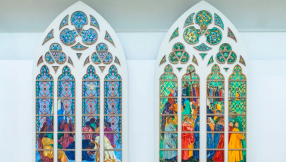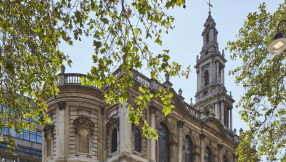London mayoral candidates affirm desire to work with churches
Ken Livingstone, Brian Paddick and Jenny Jones joined Johnson at St James’s Church, Piccadilly, for a packed mayoral hustings that was at times humorous and heated as they presented their vision for the capital to a largely Christian audience.
The debate was chaired by priest and commentator George Pitcher and prominent church leaders in the audience included the Bishop of London, Dr Richard Chartres, the head of the Roman Catholic Church in England and Wales, Archbishop Vincent Nichols, and Jesus House Senior Pastor Agu Irukwu.
Labour contender Livingstone admitted that although he used to be an aggressive atheist, his attitude had softened during his political career, which saw him previously hold the office of London Mayor from 2000 to 2008.
“Faith communities are a big part of making London work,” he said.
Commenting on London’s affordable housing crisis and the work of Christians in supporting the city’s homeless, he added: “You get much more impact with the money you put in [when working with the churches].”
Jones, the candidate for the Green Party, also expressed her desire to work with the churches in reducing the number of homeless, as she attacked the city’s “incredibly dysfunctional” housing system and the Government’s “savage” benefit cuts.
“We have to help wherever we can. Working with churches is a fantastic way of doing that.”
She also took a swipe at David Cameron’s Big Society initiative, which she said “sucks”.
“Throwing more and more people onto community resources … this Government doesn’t understand what it means to be poor or needy.”
Johnson admitted that the housing crisis was “acute” in London and that churches were “indispensable” in meeting the need. “We can do and we will do much better,” he said.
Asked about a VAT charge on alterations on listed buildings – a move that will hit the nation’s thousands of listed churches hard – Johnson called the Government’s plan “crazy”.
Challenged on his decision to block a Christian bus advert opposing homosexuality whilst allowing gay lobby group Stonewall to run an ad supporting homosexuality, Johnson said the suggestion in the Christian advert that homosexuality could be “cured” would cause “great offence”.
“The job of mayor is to unite,” he said, adding that the “backlash” against the Christian advert would have been “so intense that it would not have been in the interest of the people in this city”.
His position was supported by the other candidates.
Paddick, Lib Dem candidate and an openly gay Christian who wed his same-sex partner in a ceremony in Norway, said: “If Christians want to put up an advert against gay marriage, that would be fair enough.
“Where the implication is that homosexuality is a disease that needs to be cured, that oversteps the mark.”
Johnson later expressed his strong support for the right of Christians to express their faith.
He described the case of Nadia Eweida, a British Airways worker who was suspended for wearing a cross at work, as “absolutely bizarre”. The suggestion from secularists to end the saying of prayers at the start of sessions in Parliament was, he continued, “quite wrong”.
Livingstone said that the church leaders he had spoken to were more bothered about getting planning permission to build new churches, which some have found challenging in the past.
He promised to change the planning framework so that there is a “presumption” that congregations can build new churches.
Although all four candidates said they would have no problem if a church in London wanted to carry out gay marriage ceremonies, they agreed that there should be no compulsion for churches to do so.
“I would welcome it but it’s the church’s decision,” said Jones.
Livingstone added: “That’s a decision for congregations to make. The state should not be regulating your faith.”
Candidates were also positive about more faith schools opening in the city on the condition that they have an open admissions policy to people living in the catchment area.
The wide-ranging discussion also touched on concern over the proliferation of betting shops, fast food takeaways and Tesco Metros across London’s high streets.
Jones said that the expansion of Tesco Metros was “insidious” and that councils should have “more understanding of what makes a healthy high street”.
Paddick said a change in the law was required as “clever lawyers” were able to get around the objections put forward by local councils.
Boris admitted that new measures were needed to make it easier for local councils to block unwanted retailers from moving into an area.
“It is absolutely vital for the city that we help small businesses,” he said.













